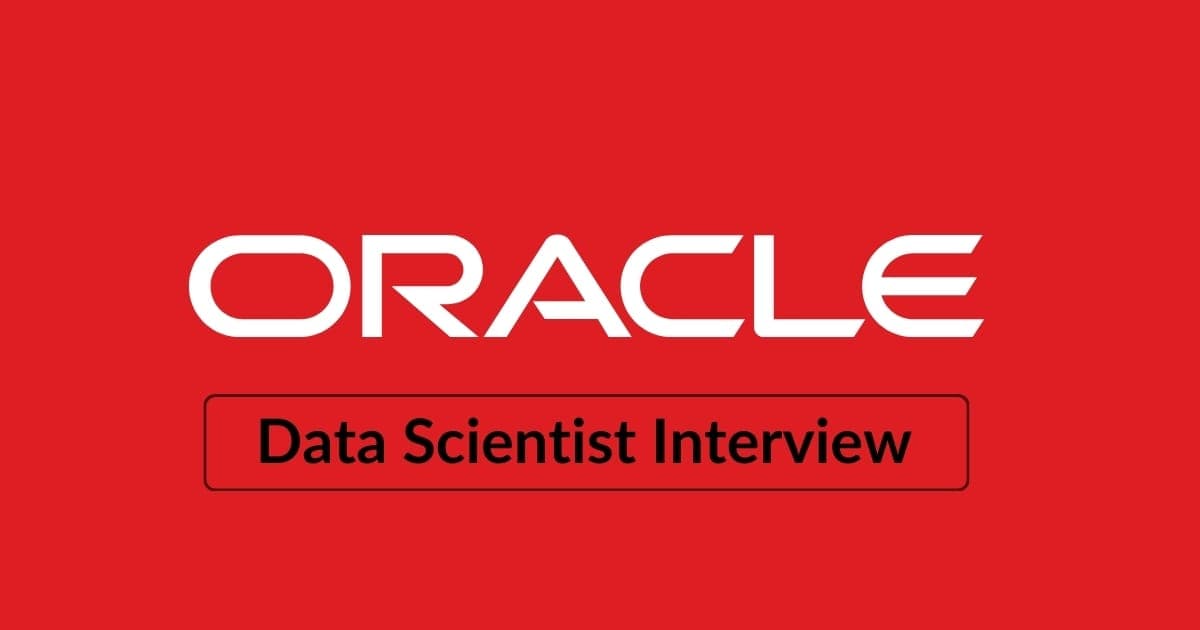Are you preparing for a Data Scientist interview at Goldman Sachs? This comprehensive guide will provide you with insights into Goldman Sachs’ interview process, the essential skills they seek, and strategies to help you excel in your interview.
Whether you are an experienced data professional or looking to advance your career in the financial sector, understanding Goldman Sachs’ unique approach to interviewing can give you a significant advantage.
We will explore the interview structure, highlight the types of questions you can expect, and share valuable tips to help you navigate each stage with confidence.
Let’s dive in 👇
1. Goldman Sachs Data Scientist Job
1.1 Role Overview
At Goldman Sachs, Data Scientists play a pivotal role in driving the success of global financial markets through data-driven strategies and innovations. This position requires a unique combination of advanced mathematical training, programming skills, and logical thinking to develop quantitative models that enhance our financial operations. As a Data Scientist at Goldman Sachs, you will collaborate with diverse teams to tackle complex financial challenges and contribute to the development of cutting-edge financial systems.
Key Responsibilities:
- Construct quantitative models to support alpha-generating strategies and optimize portfolio allocations.
- Develop predictive models for pricing, trading automation, and data analysis.
- Engage in discussions on portfolio allocation problems and provide data-driven solutions.
- Utilize open source software, databases, and cloud solutions to solve complex financial problems.
- Collaborate with engineering teams to build scalable and accurate financial systems.
- Ensure the integrity and quality of data used in financial modeling and analysis.
Skills and Qualifications:
- Strong fundamentals in distributed systems, databases, and algorithm design.
- Proficiency in programming languages and implementation of run-time systems.
- Knowledge of finance, stochastic calculus, and financial models is an advantage.
- Ability to construct and analyze complex quantitative models.
- Excellent problem-solving skills and logical thinking.
- Strong communication skills to convey technical insights to non-technical stakeholders.
1.2 Compensation and Benefits
Goldman Sachs offers a competitive compensation package for Data Scientist roles, reflecting its commitment to attracting top talent in the data, machine learning, and AI fields. The compensation structure includes a base salary, performance bonuses, and stock options, along with various benefits that support professional growth and work-life balance.
Example Compensation Breakdown by Level:
| Level Name | Total Compensation | Base Salary | Stock (/yr) | Bonus |
|---|---|---|---|---|
| Analyst | $145K | $116K | $0 | $28.5K |
| Associate | $154K | $128K | $0 | $25.5K |
| Vice President | $230K | $178K | $364 | $51.5K |
Additional Benefits:
- Participation in Goldman Sachs' stock programs, including restricted stock units (RSUs).
- Comprehensive medical and dental coverage.
- Retirement savings plans with company matching.
- Tuition reimbursement for education related to career advancement.
- Flexible work arrangements and wellness programs.
Tips for Negotiation:
- Research compensation benchmarks for data scientist roles in your area to understand the market range.
- Consider the total compensation package, which includes stock options, bonuses, and benefits alongside the base salary.
- Highlight your unique contributions and experiences during negotiations to maximize your offer.
Goldman Sachs' compensation structure is designed to reward innovation, collaboration, and excellence. For more details, visit Goldman Sachs' careers page.
2. Goldman Sachs Interview Process and Timeline
Average Timeline: 4-8 weeks
2.1 Resume Screen
The first stage of the Goldman Sachs Data Scientist interview process is a resume review. Recruiters meticulously evaluate your background to ensure it aligns with the job requirements. Given the competitive nature of this step, presenting a strong, tailored resume is crucial.
What Goldman Sachs Looks For:
- Proficiency in Python, SQL, and machine learning techniques.
- Experience with data systems and ETL pipelines.
- Projects that demonstrate innovation, business impact, and collaboration.
- Strong analytical and problem-solving skills.
Tips for Success:
- Highlight experience with A/B testing, algorithms, and analytics.
- Emphasize projects involving machine learning and statistical analysis.
- Use keywords like "data-driven insights," "ETL processes," and "predictive modeling."
- Tailor your resume to showcase alignment with Goldman Sachs’ focus on data-driven decision-making and innovation.
Consider a resume review by an expert recruiter who works at FAANG to ensure your resume stands out.
2.2 Recruiter Phone Screen (30 Minutes)
In this initial call, the recruiter reviews your background, skills, and motivation for applying to Goldman Sachs. They will provide an overview of the interview process and discuss your fit for the Data Scientist role.
Example Questions:
- Can you describe a time when your analysis directly influenced a business decision?
- What tools and techniques do you use to clean and analyze large datasets?
- How have you contributed to cross-functional team projects?
Prepare a concise summary of your experience, focusing on key accomplishments and business impact.
2.3 Technical Screen (1 Hour)
This round evaluates your technical skills and problem-solving abilities. It typically involves virtual interviews covering data systems, ETL pipelines, SQL queries, and may include take-home assignments.
Focus Areas:
- SQL: Write queries using joins, aggregations, subqueries, and window functions.
- Machine Learning: Discuss model evaluation metrics, bias-variance tradeoffs, and feature engineering.
- Data Systems: Explain concepts related to data extraction, transformation, and loading processes.
Preparation Tips:
Practice SQL queries involving real-world scenarios, focusing on data manipulation and analysis. Consider technical interview coaching by an expert coach who works at FAANG for personalized guidance.
2.4 Onsite Interviews
The onsite interview typically consists of multiple interviews throughout the day with data scientists, managers, and cross-functional partners. Each round is designed to assess specific competencies.
Key Components:
- Technical Challenges: Solve live exercises that test your ability to manipulate and analyze data effectively.
- Real-World Business Problems: Address complex scenarios involving machine learning models and data-driven insights.
- Behavioral Interviews: Discuss past projects, collaboration, and adaptability to demonstrate cultural alignment with Goldman Sachs.
Preparation Tips:
- Review core data science topics, including statistical testing, experiment design, and machine learning algorithms.
- Research Goldman Sachs’ business areas and think about how data science could enhance their operations.
- Practice structured and clear communication of your solutions, emphasizing actionable insights.
For Personalized Guidance:
Consider mock interviews or coaching sessions to simulate the experience and receive tailored feedback. This can help you fine-tune your responses and build confidence.
Goldman Sachs Data Scientist Interview Questions
Probability & Statistics Questions
Probability and statistics questions assess your ability to apply statistical methods to solve real-world problems and make data-driven decisions.
Example Questions:
- How would you calculate the probability of rain on the nth day after today?
- Are we overestimating or underestimating the actual population’s credit score using a fixed cutoff?
- Explain the concept of p-value and its significance in hypothesis testing.
- How do you handle missing data in a dataset?
- What is the Central Limit Theorem and why is it important?
- Describe a situation where you used statistical analysis to solve a business problem.
- How would you test if two datasets come from the same distribution?
For more on statistics, check out the Applied Statistics Course.
Machine Learning Questions
Machine learning questions evaluate your understanding of algorithms, model building, and the application of machine learning techniques to solve complex problems.
Example Questions:
- How would you design an ML system to extract, transform, and store data from Reddit and Bloomberg APIs for downstream models?
- Explain the bias-variance tradeoff and how it applies to building a predictive model.
- How do you handle class imbalance in a dataset when building a predictive model?
- What are the differences between supervised and unsupervised learning?
- Describe how you would evaluate the performance of a recommendation algorithm.
- What is overfitting and how can it be prevented?
- How would you select important features for a machine learning model?
Enhance your ML skills with the Machine Learning Course.
SQL Questions
SQL questions assess your ability to manipulate and analyze data using complex queries. Below are example tables Goldman Sachs might use during the SQL round of the interview:
Transactions Table:
| TransactionID | UserID | Amount | TransactionDate | TransactionType |
|---|---|---|---|---|
| 1 | 101 | 5000 | 2023-01-15 | Deposit |
| 2 | 102 | 2000 | 2023-02-10 | Withdrawal |
| 3 | 103 | 1500 | 2023-03-05 | Deposit |
Users Table:
| UserID | UserName | JoinDate |
|---|---|---|
| 101 | Alice | 2023-01-01 |
| 102 | Bob | 2023-02-01 |
| 103 | Carol | 2023-03-01 |
Example Questions:
- Total Deposits: Write a query to calculate the total amount of deposits made by each user.
- Recent Transactions: Write a query to find all transactions made in the last 30 days.
- User Activity: Write a query to list users who have made more than one transaction.
- Transaction Summary: Write a query to summarize the total deposits and withdrawals for each user.
- Join Date Analysis: Write a query to find users who joined in the first quarter of 2023.
Practice SQL queries on DataInterview SQL pad.
Behavioral Questions
Behavioral questions assess your ability to work collaboratively, navigate challenges, and align with Goldman Sachs’ mission and values.
Example Questions:
- Describe a time you used data to influence a product or business decision.
- How do you approach balancing multiple projects and deadlines?
- Share an example of a challenging dataset you worked with and how you handled it.
- Tell me about a time you disagreed with a teammate on a data analysis approach and how you resolved it.
- How do you incorporate feedback into your work to ensure continuous improvement?
4. Preparation Tips for the Goldman Sachs Data Scientist Interview
4.1 Understand Goldman Sachs' Business Model and Products
To excel in open-ended case studies at Goldman Sachs, it’s crucial to understand their business model and the range of financial products they offer. Goldman Sachs is a leading global investment banking, securities, and investment management firm that provides a wide range of financial services to a substantial and diversified client base.
Key Areas to Focus On:
- Revenue Streams: Understand how Goldman Sachs generates income through investment banking, securities, and investment management.
- Financial Products: Familiarize yourself with their offerings, including asset management, securities, and advisory services.
- Market Position: Analyze Goldman Sachs' role in global financial markets and their competitive advantages.
Having a solid grasp of these aspects will help you tackle case studies and business problem questions effectively.
4.2 Enhance Your Technical Skills
Goldman Sachs places a strong emphasis on technical proficiency, making it essential to hone your skills in programming, data manipulation, and machine learning.
Key Focus Areas:
- Programming Languages: Master Python and SQL for data analysis and manipulation.
- Machine Learning: Understand model evaluation metrics, feature engineering, and the bias-variance tradeoff.
- Data Systems: Gain proficiency in data extraction, transformation, and loading processes.
Consider enrolling in a Data Scientist Interview Bootcamp to strengthen these skills.
4.3 Practice Probability and Statistics
Probability and statistics are fundamental to the data scientist role at Goldman Sachs. You will need to apply these concepts to solve real-world financial problems.
Key Concepts:
- Hypothesis testing and p-values.
- Central Limit Theorem and its applications.
- Handling missing data and data distributions.
For more in-depth learning, consider exploring courses on applied statistics.
4.4 Develop Strong Communication Skills
As a Data Scientist at Goldman Sachs, you will need to convey complex technical insights to non-technical stakeholders effectively.
Tips for Improvement:
- Practice explaining technical concepts in simple terms.
- Engage in mock interviews to refine your communication style.
- Highlight your ability to translate data-driven insights into actionable business strategies.
Consider coaching services for personalized feedback and improvement.
4.5 Simulate the Interview Experience
Mock interviews can significantly enhance your readiness and confidence. Practicing with a peer or a professional coach can help you refine your answers and receive constructive feedback.
Tips:
- Structure your responses for technical and behavioral questions.
- Review common interview questions to align your answers with Goldman Sachs’ values.
- Engage with professional coaching services for tailored guidance and feedback.
Mock interviews will help you build communication skills, anticipate potential challenges, and feel confident during Goldman Sachs’ interview process.
5. FAQ
- What is the typical interview process for a Data Scientist at Goldman Sachs?
The interview process generally includes a resume screen, recruiter phone screen, technical interviews, and onsite interviews. The entire process typically spans 4-8 weeks. - What skills are essential for a Data Scientist role at Goldman Sachs?
Key skills include proficiency in Python and SQL, strong knowledge of machine learning algorithms, statistical analysis, and experience with data systems and ETL processes. Familiarity with financial concepts and quantitative modeling is also advantageous. - How can I prepare for the technical interviews?
Focus on practicing SQL queries, machine learning concepts, and statistical methods. Engage in real-world data analysis scenarios and review topics such as model evaluation metrics, feature engineering, and data manipulation techniques. - What should I highlight in my resume for Goldman Sachs?
Emphasize your experience with quantitative modeling, data-driven projects, and collaboration in cross-functional teams. Tailor your resume to showcase your technical skills, business impact, and alignment with Goldman Sachs’ focus on innovation and data-driven decision-making. - How does Goldman Sachs evaluate candidates during interviews?
Candidates are assessed on their technical skills, problem-solving abilities, and cultural fit. The interviewers look for strong analytical thinking, effective communication of complex ideas, and the ability to work collaboratively in a team environment. - What is Goldman Sachs’ mission?
Goldman Sachs’ mission is to advance sustainable economic growth and financial opportunity across the globe, leveraging data and technology to drive innovation in financial services. - What are the compensation levels for Data Scientists at Goldman Sachs?
Compensation for Data Scientists varies by level, with total compensation ranging from approximately $145K for Analysts to $230K for Vice Presidents, including base salary, bonuses, and stock options. - What should I know about Goldman Sachs’ business model for the interview?
Understanding Goldman Sachs’ role in investment banking, securities, and investment management is crucial. Familiarize yourself with their revenue streams, financial products, and how data science can enhance their operations and decision-making processes. - What are some key metrics Goldman Sachs tracks for success?
Key metrics include portfolio performance, risk-adjusted returns, client acquisition and retention rates, and the effectiveness of trading strategies. Understanding these metrics can help you align your data-driven insights with business objectives. - How can I align my responses with Goldman Sachs’ mission and values?
Highlight experiences that demonstrate your ability to leverage data for impactful business decisions, your commitment to innovation, and your collaborative approach to problem-solving. Discuss how your work has contributed to financial growth or improved operational efficiency.



